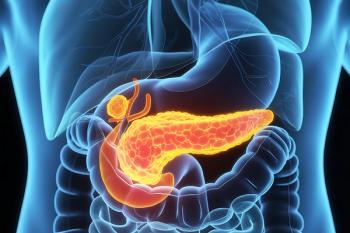
Type 2 diabetes therapies may increase HF risk
The use of any pharmacological therapy for type 2 diabetes appears to be associated with an increased risk of heart failure (HF). However, the risk does not extend beyond the first year after diagnosis and does not appear to differ among the types of drug therapy, according to researchers who assessed 25,680 patients in the UK General Practice Research Database between 1988 and 1999. The researchers categorized person-time drug exposures to monotherapies in insulin, sulfonylureas (SUs), metformins, and other oral hypoglycemic agents (OHA), and combination therapy including insulin, combination therapy without insulin, and triple combination therapy with or without insulin.
The primary end point of incident HF was assessed by comparing patients using each of the 7 types of therapies, with a drug-free interval serving as a reference category. Patients were excluded if they:
Among all participants with 43,390 drug exposure intervals (defined as the duration from the onset of a drug exposure to the onset of the next drug exposure or until HF) during 67,787 person-years, at a mean follow-up period of 2.5 years, 1,409 patients developed HF (732 men, 677 women). SU monotherapy was most frequently prescribed (n=11,350), followed by metformin monotherapy (n=4,579) and OHA combination therapy (n=4,107). HF occurred most frequently in SU monotherapy intervals (4.7%), followed by drug-free intervals (2.9%) and metformin monotherapy intervals (2.8%). Over the entire period, incidence of HF was the highest in SU monotherapy (26.6 per 1,000 person-years), followed by insulin combination therapy (23.4 per 1,000 person- years). The HF incidence in the drug-free period substantially increased as time elapsed at 6.8, 14.7, and 34.4 per 1,000 person-years, up to 1 year, 1-2 years, and beyond 2 years, respectively. In all age groups, women experienced a lower incidence rate than men.
The hazard ratios of combination therapies were as follows:
Researchers also aggregated all 7 type-specific drugs used into an "any drug use" category and compared any drug use to drug-free use. Participants taking any drug exhibited a 4.75 relative risk for HF (3.57–6.33) compared with participants taking no drugs in the first year, and risks of 1.21 (0.82–1.78), 0.89 (0.70–1.14), and 1.54 (1.31–1.80), in the second year, beyond second year, and entire period (total), respectively. Any prior or immediately preceding drug use did not demonstrate a predictive ability beyond the current drug use.
Limitations to the study included the short duration of average follow-up and the fact that the short duration of the drug exposure intervals may have limited the detection of drug effects.
SOURCE Maru S, Koch GG, Stender M, et al. Antidiabetic drugs and heart failure risk in patients with type 2 diabetes in the U.K. primary care setting. Diabetes Care. 2005;28:20–26.
Newsletter
Get the latest industry news, event updates, and more from Managed healthcare Executive.























